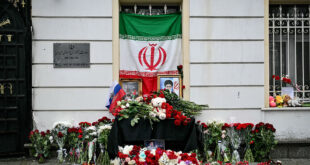VIENNA (Reuters) — Iran faces heightened criticism over its escalating nuclear activity at a UN watchdog meeting this week that will provide a barometer of sentiment for broader sanctions against Tehran.The regular June session of the International Atomic Energy Agency’s 35-nation governing board starting on Monday will focus global attention on Iran’s rapidly expanding uranium enrichment programme and its reduced cooperation with IAEA inspectors.
The United States and key allies suspect Iran is pursuing the means to make atom bombs behind the facade of a civilian nuclear energy programme. Iran says it wants only electricity from enrichment, but has hindered IAEA investigations for years.
“Criticism of Iran will be stronger than before since it is both extending enrichment and reducing cooperation. It doesn’t bode well. The standoff will worsen,†said an Asian diplomat.
A May 23 IAEA inspector report said Iran had not only ignored a UN deadline to stop enrichment but had made big strides in its programme since the start of this year.
A UN official said Iran now had 2,000 centrifuges on line and was on pace for 3,000 by next month. That would lay the basis for “industrial scale†enrichment that could yield enough refined uranium for an atom bomb within a year.
Iran says it will only enrich uranium to the low grade required for atomic power reactors, not the far higher grade needed for bombs.
IAEA chief Mohammad Al Baradei upset Western powers last month by saying their bid to deny Iran the requisite technology had been “overtaken by eventsâ€. Their demand for suspension as a foundation for negotiations no longer seemed realistic, he said.
Washington rejected Baradei’s remarks as interference and may push at the board for swift UN Security Council action on wider sanctions, backed by close Western allies, although Russia and China could well urge caution and more diplomacy first.
Â
‘Deteriorating knowledge’
Â
IAEA board members will also voice deep concern over the agency’s “deteriorating knowledgeâ€, cited by the report, about the scope of Iranian nuclear activity.
In April, Iran stopped providing advance design information on planned nuclear sites, such as a heavy-water reactor.
For over a year, Iran has limited inspections to declared nuclear sites, barring short-notice visits to other areas to probe indications of undeclared activity with military links.
A senior European diplomat said no board member state, not even from the Non-Aligned Movement of developing nations to which Iran belongs, objected to the report’s findings when the 35 were briefed by a senior IAEA official last week.
“Iran’s behaviour is making it pretty lonely now,†he said, adding that unless Tehran changed approach quickly, “there will be no alternative but to resume the Security Council approach.†A Western diplomat said Iran was also reneging on a deal allowing short-notice inspections at its underground centrifuge plant by preventing inspectors from walking around among the machines and taking pictures. Two other diplomats said they were told Iran was delaying some inspector trips to the Natanz plant.
But senior UN officials said there were no problems with access to Natanz. “Inspectors had to reschedule some visits to ensure certain equipment or people needed on either side are available, but just a day or two later,†one told Reuters.
The board will also debate an increase in the IAEA budget for 2008 after Baradei complained of “shoestring†funding even though nuclear proliferation threats are spreading.
 Eurasia Press & News
Eurasia Press & News



